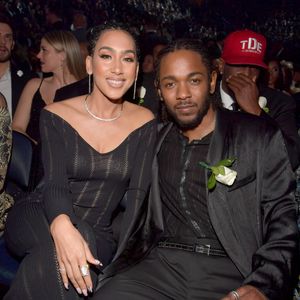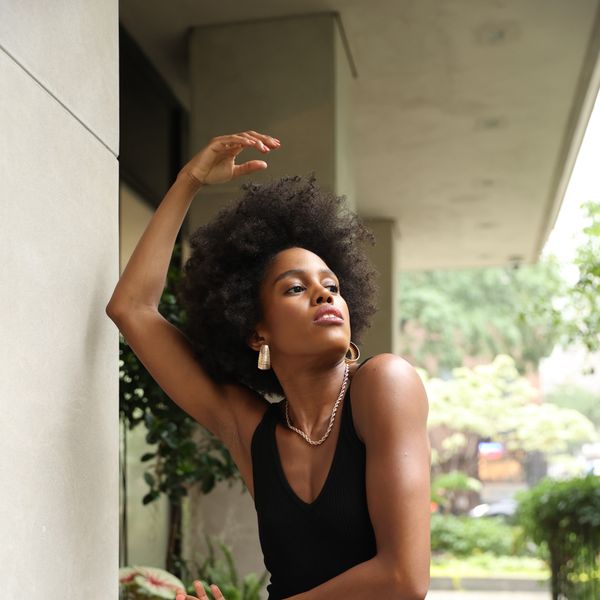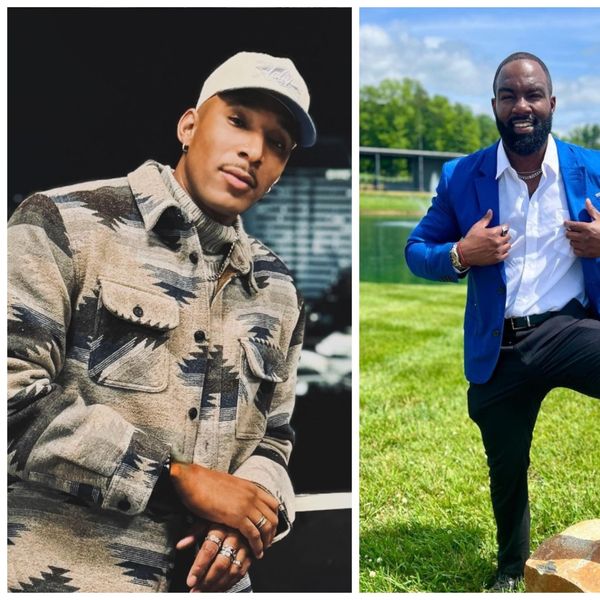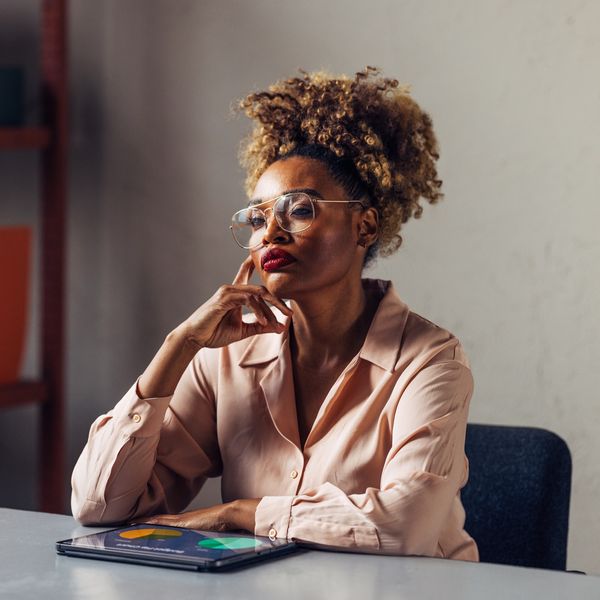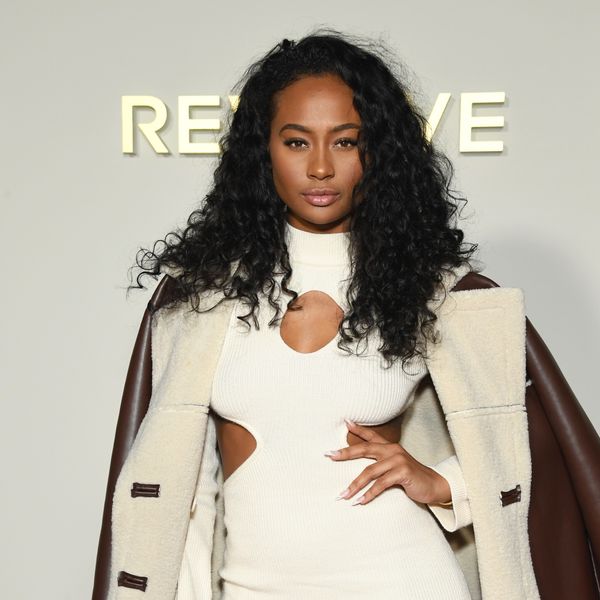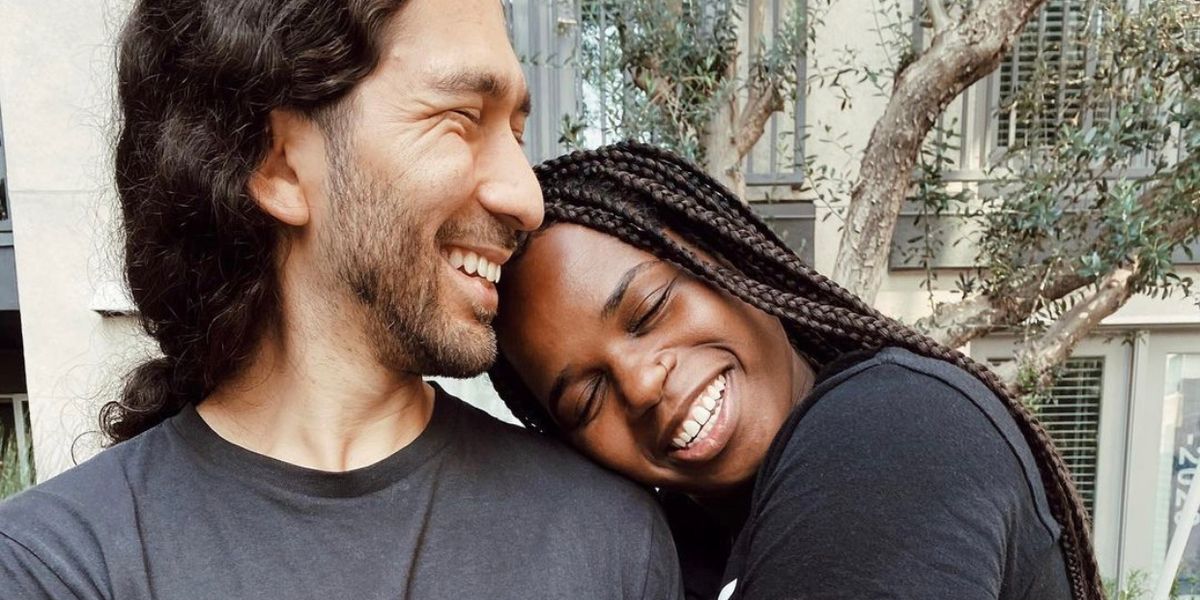
These Interracial Couples Talk Navigating Race In Today’s America
There is a quote by Santosh Kalwar that states, "Love has no culture, boundaries, race, and religion. It is pure and beautiful like early-morning sunrise falling in lake." While this might be true, the year 2020 has made us more aware of the different experiences we face in this country based on the color of our skin. With this year's cultural climate shift, I was curious to learn more about the experience of being in an interracial relationship during this time. While I believe every relationship is different and has its own nuances, what does it look like when race has played a part in the relationship, if at any point at all? I was able to speak to two couples who offered some perspective on how they navigate everything together.
Courtney & Jackson

Courtesy of Courtney & Jackson
Courtney: We had been friends for 10 years and have been a couple for five. We basically met through mutual friends. Before I met Jackson, I've mostly dated within my race or been with men of color. With Jackson, for the more serious relationships, he has dated women of color before he met me. As far as race being an important part in our relationship, it is not something we center our relationship around. We talk about race a lot, and learning about Jackson's childhood was different than what I had expected. Hearing that he grew up in the inner city and he was around people that looked like me kind of checked me a little to not be as narrow-minded.
Jackson: I do feel that I have a different perspective than the average person from the South. I spent a lot of time in neighborhoods where I was the only white person. So I was exposed early on to the mistreatment that happens in communities and by law enforcement. Even in those moments, I knew I was treated differently than the people I was hanging out with.
Have you ever felt that you are treated differently by family and friends because you are in an interracial relationship?
Jackson: My parents were gracious when they didn't understand why I would bring black women home. So they have been working on things before they met Courtney. But with the recent Black Lives Matter movement, there have been great conversations.
Courtney: With Jack's parents, they grew up traditionally Republican. They also have a son (Jack) who dates black women and is a criminal defense attorney, so they get tidbits on how unfair the justice system is. With George Floyd, they were made aware of so many things at once. They have had some really in-depth and hard conversations with us as a couple, saying, "'We weren't fully where we are now and we want to talk about. We are a little upset we weren't there before, but we are here now and we want to ask and learn more.'" I think that's been one of the beauties of us being together in these times.
What is a misconception that you often face as an interracial couple?
Jackson: One misconception is that people don't understand that you are still handling things as a unit. People think that because we are in an interracial relationship, we [either] have things figured out, or the opposite, [with] people thinking that everything is screwed up in the relationship because of the crazy times. Neither one is true.
Courtney: For me being a black woman, I get put in this stereotype of white-washing my culture and intentionally trying to be with a white person instead of me being with the person I love. It's a little bit harder because if you speak to him and talk to him, you can understand why I'm with him. But on the surface it might not look that way, especially during the pandemic.

"As far as race being an important part in our relationship, it is not something we center our relationship around. We talk about race a lot, and learning about Jackson's childhood was different than what I had expected. Hearing that he grew up in the inner city and he was around people that looked like me kind of checked me a little to not be as narrow-minded."
Are there any things you had to unlearn about race in order to gain an understanding of each other?
Jackson: One thing that I will say in general—something that she repeats—'All skin folk aren't kinfolk.' Everybody that you expect to be on your side, whether they are related to you or because they look like you, is not always going to be on your side.
Courtney: That is something I am actively practicing, too, not just for people who look like me, but for people I have known my whole life. I am just trying to learn more about people because not everyone wants to learn more, and even though they look like you, you can't make them do anything they don't want to.
Ashley & Chea

Chea: We met for the first time at the Jay-Z and R. Kelly 'Best of Both Worlds' concert. I had recently gotten out of a relationship, and she was in a relationship at the time. She actually grew up with one of our mutual friends, Jero, who I ended up working with, and we would intentionally continue to cross paths and got introduced to each other.
Ashley: We were friends for four years before we started any commitment. We had a really deep friendship, so we both trusted each other. To be candid, at the time, we were just having fun. I wasn't thinking about being with him forever. So I didn't take his race into consideration. When I became pregnant, that is when race started to become a topic to discuss more.
Chea dated any woman he was attracted to regardless of race before we got together, where I specifically dated black men. I grew up in a pro-black community. So for me, when I visualized my life, I thought I was going to have dark brown babies like myself, marry a dark-skinned man, listen to Talib Kweli, and burn incense. It was intentional, but it wasn't exclusionary.
How do you educate one another (and yourselves) on your racial or cultural differences?
Chea: When we started our relationship, we really educated each other around the black culture and practicing [Islam]. She learned about my father's side and Buddhism. If we knew there was something that was important to us, we would share that with each other. I think what I have been mainly focusing on the last five years years is bridging the gap between what I've learned versus what I know from how I grew up.
I grew up in a majority-white neighborhood. So, 2020 has been an eye-opener where I'm not doing something correctly or no matter what I say, it's not making a substantial change. Whereas with Ashley, she's not at the point to sit down and educate people on how it is to be a black woman in America. She has been doing this her whole life, so she stands for educating yourself.
Have you ever felt you were being treated differently by family and friends because you were in an interracial relationship?
Chea: My mother is Caucasian and my father is Cambodian. It's layered, but on the surface, my mother's side was more accepting. We would go to family gatherings and there wouldn't be any issues really. On my father's side, the Asian side, the biggest pushback came from my stepmother. Both of my parents remarried, but with my father's side, there was confusion on how our relationship was coming together. You know, when people don't have an actual issue with something until it actually affects them? I think that's something you can apply to a lot of different things. Everything is great until it impacts you. Now five years into our marriage and 10 years into our relationship, I feel we are at a place where things are copacetic, but there are still those things that need to be worked through.

"I grew up in a pro-black community. So for me, when I visualized my life, I thought I was going to have dark brown babies like myself, marry a dark-skinned man, listen to Talib Kweli, and burn incense. It was intentional, but it wasn't exclusionary."
Were there things you had to teach your partner about being black in America that they may not have understood before?
Ashley: That's the thing about being in an interracial relationship. Chea doesn't experience the world the way I do. Even when I am getting profiled in a store, he is still existing in his own bubble. I sometimes would have to point it out to him and make him walk into a store and see who speaks to him. Now, watch when I walk in. I think these are things that white people miss everyday. When you are not existing in these spaces, you have the ability to look at things from an objective point of view, whereas we don't.
Chea: It's a very true experience and it's dependent on where we are, whether it's online or in-person.
"When you are not existing in these spaces, you have the ability to look at things from an objective point of view, whereas we don't."
Are there any things you had to unlearn about race in order to gain an understanding of each other?
Ashley: The growth for me came from within our marriage. I stopped looking at his Asian family as racist and started diving deeper into understanding where they are coming from having immigrated to this country. I don't think his family was being intentionally racist to me, they were just ignorant. But as soon as they got to know me, most of them changed immediately.
Chea: The thing that I had to unlearn is that every scenario doesn't always have the same outcome. For example, the police brutality, I think the common discourse for people who are not black is that, 'What did so and so do to get to this point?' That was my common way of thinking. Whether it was good or bad, something must have happened. I learned to let go of that and empathize more, regardless of what happened before.
Race aside, what is one thing that you truly enjoy about your partner?
Courtney: Jack is widely empathetic. He is able to relate to a lot of people on different journeys because he listens and can be present with them.
Jackson: There's a ton, but if I have to pick just one, it would be her creative spirit. I admire that about her and hope that her creative spirit sparks some creativity in me.
Ashley: Chea always felt like home to me, even before we were serious—when we were just friends. He is honestly one of my favorite people in the world. He is very loving and is a good person to everybody, not only to me which is important to me. If I had to choose one thing it would be his heart. Because that's where all of his good qualities stem from.
Chea: I feel like throughout various stages of our relationship I have loved her, and I just keep finding my love for her growing bigger. I can't really explain it. As I am trying to become a better person, she has been forcing me and helping me because she can see things I don't see. So I love her for that reason as well.
The two important things to know about relationships, whether you and your bae are of the same race or different races, are to be understanding of one another and to make your own rules. When you are intentional about knowing your partner's likes and dislikes, how you complement one another, and being empathetic to each other's experiences, race does not have to be a huge factor.
There will always be different obstacles that can make things challenging, but once you know who your partner is as a human being, you are able to create your own blueprint in order to make it through together. You should not go by other people's opinions or what others expect your relationship to be and with whom. At the end of the day, it is about what makes both of the people happy. Everyone is different and in the words of Chea, "Your results may vary."
Featured Image by Shutterstock
'K' is a multi-hyphenated free spirit from Chicago. She is a lover of stories and the people who tell them. As a writer, 9-5er, and Safe Space Curator, she values creating the life she wants and enjoying the journey along the way. You can follow her on Instagram @theletter__k_.
These Newlyweds Found Love Thanks To A Friend Playing Matchmaker
How We Met is a series where xoNecole talks love and relationships with real-life couples. We learn how they met, how like turned into love, and how they make their love work.
Jason and Elise Robinson’s union is a reminder that kind people still get their happily ever after. The pair had their first date in October of 2021 and tied the knot on June 15, 2024. Both of them have dedicated their lives to celebrating and supporting Black culture so it was only fitting they get married in what's considered the Black Hollywood of America during the Juneteenth celebration weekend. From the florists to Elise and Jason's gown and suit designers to the table signage and so much more, everything was Black-owned. It's no wonder their love for Black culture was the jumping-off point for their love story.
When they met, Jason had just moved to Atlanta for a new job opportunity, and Elise was living happily in her career and had put dating on the backburner. But luckily, a mutual connection saw something in both of them and thanks to a yoga-themed baby shower and a chance text message, they found their forever. Check out their beautiful How We Met story below.
I’ll start with the easiest question. Can you both tell me a little bit about yourself and your background?
Elise: Sure, my name is Elise. I’m actually from Atlanta, GA – not a transplant. I grew up here and left right after college to pursue my career. Now I’ve been back going on eight years, and I’m in my early 40s.
Jason: And I’m Jason. I’m originally from Racine, Wisconsin. I went to school at Florida A&M University, so I am a rattler. I went back to the Midwest for a period of time, in Indianapolis. Now, I’ve been in the Atlanta area for a little over two and a half years.

Jason and Elise Robinson
Photo by FotosbyFola
Wow, that’s nice because Atlanta gets a bad rap when it comes to relationships. So you have to give us the deets. How did you two find each other?
Elise: So I work in TV and I was on-air for a number of years and then transitioned into being a producer and then a manager. As a producer, I’d always have guests on. And there was a woman who came on frequently named Rosalynn (@Rosalynndaniels, often referred to as The Black Martha Stewart), and we connected instantly. Anyway, she got pregnant right before COVID and invited me to a “modern-day yoga baby shower.” I came to support, but was also just curious about that theme.
I had an amazing time. And when it was over a few of us stuck around and convos got personal. She ended up asking me the infamous ‘Are you dating’ question. When I told her no, she decided to set me up. So I should tell you, in both of my only two serious relationships, I was set up – so I was like no.
But she pointed at her husband, who was folding up chairs, and said that another friend set her up with him. Sometimes, it takes people outside of us to see what we need. A few months later, she reached out and said she had family relocating and thought I’d really like him. So she gave him my number, and I reached out with a text. He responded with a call, and that night, we talked for about 2-3 hours. So that’s how we met. I was a little nervous because me and Rosalynn were starting a friendship, and here I was, talking to her family!
Jason: It was new for me too. Remember, I was new to the area, and I had heard so many “stories” about how people have been done wrong in the dating world. Whether it’s by theft or scamming (laughs). Plus, I had just got a new job and wanted to focus on that. But I did want to be able to date someone in a more personal way and see where it led. I felt like who better than someone who I trust to connect me. Rosalynn knows I’m private, about business life, and my personal life is important to me.
So let’s get into your courtship. What was your first date like?
Elise: We had our first convo on a Monday, and he asked me out the next day. I didn’t have any plans, but I still said no. I was just playing hard to get (laughs). But we were talking every day, and he told me he wanted to take me somewhere I’ve never been. And I’m like, you’re in my city! But he sends me three options, and sure enough, two of the places I hadn’t gone to. So, our first date was October 1, 2021, and somebody was 45 minutes late.
Now Jason, why were you 45 minutes late?
Elise: It was me – in my own city. I just got turned around, and the traffic was horrible. I kept calling him and giving him permission to leave. Full transparency: I probably wouldn’t have waited if the shoe was on the other foot. But this was my first sign of what I now know and love the most about him. It’s his patience. When I got there, I was frazzled and everything, but he was just super calm. It ended up being a great first date.
Jason: I remember just waiting and being concerned for her well-being. Because I know how traffic can be, especially when someone is rushing. I was just scrolling through my phone and looking through the menu. It was cool.

Elise and Jason Robinson
Courtesy
That’s beautiful. Now let’s talk about the “what are we” convo? Did you have one of those and if so, who initiated it and how was it?
Elise: I initiated it. Jason was dating me – and still does. But by this time, we had been on a number of dates. We were on our way to a winery, and we had a bit of a drive. So I decided to state my intention. We were just a few weeks in, but we were spending a lot of time together and we are people of a particular age. So I told him, I know Atlanta can be a Black man’s playground. There’s so many beautiful professional women here. But I’m dating with intention. I don’t want to kick it or hang with a good guy even though he’s not my person. I was done with all of that. So I’m “laying down the law” in my eyes, and he didn’t flinch. He let me finish and basically let me know we were on the same page. He was not trying to sow his royal oats.
Jason: Yeah, I was not trying to be Prince Akeem. But also, it was more so about setting a tone and goal for myself. My mama always told me to set my goals. And having a family was always one of mine. I think the biggest thing of it all, was I felt blessed – in terms of moving for work and meeting Elise, now being married. There’s victories being placed in my life.
I love that you both shared that because sometimes I get feedback on these stories and it seems like sometimes we’re afraid to really voice what we desire, no matter what that looks like.
Elise: Yeah, I think sometimes women feel like they don’t want to put pressure on their partner. But it’s not pressure. Look, Jason and I are based in faith, and what is for us is for us. Being upfront and honest is best – and early makes sense. You don’t have to convince someone to be your person.
Jason: I think her sharing those values resonated with me, and hearing her “lay down the law” was fine because I was there, too. I would say to millennial women, don’t be afraid to tell a mate what you want. You never know what that would lead to. Time is a precious commodity. Elise saying that early on showed me that she values both of our time. It showed her heart, character, and integrity, and I was drawn to that and the mature conversation. In the social media world, we don’t have those pointed conversations face-to-face. I would challenge readers to have those conversations in person, and you would get more from that convo than any post or reel. Because you see body language reactions and have deeper communication.
Yeah, I think sometimes women feel like they don’t want to put pressure on their partner. But it’s not pressure. Look, Jason and I are based in faith, and what is for us is for us. Being upfront and honest is best – and early makes sense. You don’t have to convince someone to be your person.
You both have mentioned time, family, and integrity. I’m curious what other core values do you both share?
Elise: Early on, our faith. Not just do you believe in God. It had to be deeper in that. I needed someone who would lead me, our home, and our family. I didn’t want to be in a push-and-pull relationship about prayer, church, or have conversations about being better people. Also, we discussed finances. That doesn’t just mean going to work. We chatted about ownership and what it looks like for us. How do we support each other individually and together? I know I like having my hands in a few different pots, and I needed someone who was supportive of that and likewise.
Jason: My background is that I was raised in the church. My father is a deacon and my mom is a deaconess. They've been married for 55 years. Faith was very important to me and it was crucial that my wife have that relationship as well.

Elise and Jason Robinson
Photo by FotosbyFola
Can we talk about challenges? Big or small, what are some things you had to grow through together?
Elise: I have never lived with anyone – not a roommate, a sister, friend, boyfriend or anything. Now, I’m in my 40s and I'm living with someone. When you’ve been by yourself for so long that was a challenge for both of us. We weren’t pulling each other's hair out but I’m a bit extreme. Things are color-coded in my closet. For me, working in news is chaotic so I want my home to be peaceful and organized.
Jason: I’m a man, and she’s a woman. That dynamic alone adds a flair to it. She wants things a certain way. She’s a Capricorn. But just in terms of how she wants to keep a home was a big adjustment for me. It took time.
On a smaller level, what are some of the things you disagree about day-to-day?
Elise: Cleanliness and systems. Like, he recycles and I do not. But sometimes I just have to decide if it really needs to be a thing or if I can just take care of it.
Jason: This is where my organization takes over (laughs).
What are your love languages? Do you know?
Elise: Jason’s is an act of service which works because I love cooking for him. It doesn’t feel like a chore to me. I love when I’m out, picking up his favorite juice. The other day I saw he needed t-shirts while folding clothes. So I just like doing small things for him that he doesn’t expect. He’s very much that guy that will ask to help so it doesn’t bother me.
Jason: I’d say Elise is all of them, but physical touch would probably be the biggest one. I had to get used to that. She’s taught me it in a number of ways. I remember we actually talked about love languages, and I sent her this song called “More Than Words” by Extreme. That explained to her how I felt.
Finally, can we end with the proposal? Tell us everything!
Jason: It was at a restaurant. And again, I was trying to find somewhere she hadn’t been. Also, I didn’t want to do it on our anniversary because that would have been too obvious. I contacted one of the restaurant’s staff and decided to change up the dessert menu. Each item was something special to us.
Elise: We go on so many date nights, so I just thought it was a regular night. We had finished eating, and I had to go to the bathroom. They had a nice mirror, girl. So I’m in there taking videos and stuff.
Jason: While she’s in the restroom, I’m getting everything in place with the waitress.
Elise: So as I’m reading the menu, I realize it’s telling our story and he eventually proposed. It was so special; I actually had the menu framed! It was so beautiful and thoughtful.
Let’s make things inbox official! Sign up for the xoNecole newsletter for love, wellness, career, and exclusive content delivered straight to your inbox.
Feature image by FotosbyFola
This Is How To Make Essential Oils Your Ultimate Nail Health Hack
Something that I will forever back until the end of time is essential oils. One reason is that they are all-natural (essential oils are basicallyplant extracts). Another reason is that the (proven) holistic health benefits that come with using them (consistently) aredamn near endless. And lawd, don’t even get me started on how wonderful many of them smell — and how they tend to last longer than a lot of the perfumes and colognes that are out there. Definitely, for as long as essential oils are in existence, I’ll be singing their praises.
Today, the lane that I’m gonna be in is how you can apply certain essential oils to your nail care regimen. Since it should be the goal of all of us to be intentional about doing what we can to havestrong and healthy nails, I’m going to share with you 10 oils that are proven to help you reach that very goal (just make sure that youmix them with a carrier oil like apricot, grapeseed or jojoba first; essential oils are way more potent than they are oftentimes given credit for).
The Best Essential Oils for Nail Health

Getty Images
1. Tea Tree Oil
Believe it or not,nail fungus is pretty common.Some studies say that 1 in 10 people will experience it; that number jumps to 1 in 2 for individuals over 70. When it comes to this, signs to look out for are nails that look white, yellow, or brown, nails that seem to rise up from your nail bed, nails that are cloudy-looking in areas, and/or nails that easily break or split in more than one spot. Depending on how serious the fungal growth is, your doctor may prescribe an oral medication, a prescription-strength topical one, or even try a laser treatment of some sort.
However, if what you’re going through is minor, you might only needsome tea tree oil to get everything under control. Since it’s the type of essential oil that contains potent antifungal and antiseptic properties, applying it to nail fungus can significantly reduce fungal growth in a relatively short period of time without over-drying your nails in the process.
2. Myrrh Oil
Since myrrh oil contains so many powerful antioxidants and is able tokill harmful bacteria quickly, that already makes it a great essential oil for nail care. Also, since it contains properties that help to keep your skin healthy, it’s also a wonderful cuticle oil (especially if you mix it with a carrier oil like sweet almond oil, plum oil, or sesame oil). Another thing to keep in mind is if you’ve recently injured your nail(s) in some way, myrrh oil contains properties that help to reduce swelling at a pretty accelerated pace.
3. Juniper Berry Oil
An essential oil that has a good reputation for both healing as well as protecting your skin is juniper berry oil. In fact, if you’ve got a bit of foot odor going on or you’ve noticed some nail fungus creeping up, if you apply the oil to your feet (or nails) while you’re in the shower, it can help to eliminate the smells and speed up the healing process.
Another bonus about this particular oil is it has astringent properties that can help to keep your nails nice and clean.

Getty Images
4. Lavender Oil
Another oil that’s ideal forfighting nail fungus is lavender oil. In fact, in Healthline’s article, “Can You Use Essential Oil for Toenail Fungus?” lavender is on the list. That’s not all. If you happen to havenail eczema,the properties of lavender oil have the ability to soothe and heal the symptoms that come along with it, including nail softness and shedding. It’s also a good idea to keep in mind that if you want to addmoisture to your nails or cuticles, lavender oil is one that can hydrate your nails without a ton of residue.
5. Clove Oil
Since clove oil is considered to be an antimicrobial oil, it’s another one that is able to kill bacteria. Something else that’s cool about this oil is it can bring quick relief to pain and discomfort if you’ve broken a nail or you’ve got a hangnail that’s getting on your last nerve.Two other big wins about clove oil are it can help to even out any skin discoloration that you may have around your cuticles and it can help to keep your nails and hands looking youthful too (because, yes,nails do age).
6. Sage Oil
Sage oil also has some pretty impressive antibacterial properties in it. It also has the ability to condition your skin as well as your nails. This means that if you happen to struggle with brittle nails or nails that seem to peel, applying this oil to it can help to naturally reverse those issues. Also, if your nails seem to look a bit on the dull side, sage nails can give them a natural sheen if polish isn’t (really) your thing.

Getty Images
7. Geranium Oil
An essential oil that’s great at fighting off all types of infections isgeranium oil. What I especially like about it,as far as nail care is concerned, is that it’s got a solid reputation for moisturizing your nails so that they’re able to grow stronger and longer. Since it’s an oil thatcontains anti-aging properties, geranium oil can help to keep your hands (and feet) younger-looking for a longer period of time as well.
8. Lemon Oil
Hangnails are the absolute worst. Typically, those annoying things come as the result of having dry cuticles or constantly picking (or biting) the skin around your nails. If you make a cuticle oil out oflemon oil, not only can that help to nourish your cuticles and nails, but it can also repair any tissue damage that you may have as well as deeply cleanse your nails too. This, as a direct result, can help your nails to become stronger over time (plus, it doesn’t exactly taste the best, so it can help to keep your mouth off of your nails…which is a good thing).
9. Eucalyptus Oil
One of the most potent ways to treat a nail fungal infection is toapply some eucalyptus oil to it. In fact, one of the best things about taking this particular all-natural approach to a nail infection is it can kill the fungi without totally drying out your nails in the process. Also, if you’re looking for an oil that will protect your all-natural nails frompotential environmental damage, eucalyptus oil totally has your back as far as that is concerned.
10. Vanilla Oil
Now,I’m definitely preaching to the choir when I say that you should take a break from nail polish every once in a while. Just like your skin needs a mini-vacation from cosmetics and your hair needs one from the product (build-up), your nails need time to breathe on occasion, too; otherwise, the chemicals in the polish can lead to breakage, peeling, and weak nails overall. And while you’re on the break, try applying some vanilla oil to your nails and your nail beds.The antioxidants in the oil can help to speed up the healing process of your nails as well as reduce inflammation (if you’ve got any of that going on). It can also help to nourish your nails as they prepare for another few months of nail color.
___
I’m telling you, although there are all kinds of nail products on the market, if you get your hands on a few staple essential oils, you can feel confident that you’re giving your nails some chemical-free, holistically beneficial oils that will get your nails right in so many ways. I’m looking at my nails as I’m typing all of this out, and I can certainly attest to it. Try it — ain’t no way that you (and your nails) won’t like it!
Let’s make things inbox official! Sign up for the xoNecole newsletter for love, wellness, career, and exclusive content delivered straight to your inbox.
Featured image by ozgurdonmaz/Getty Images

